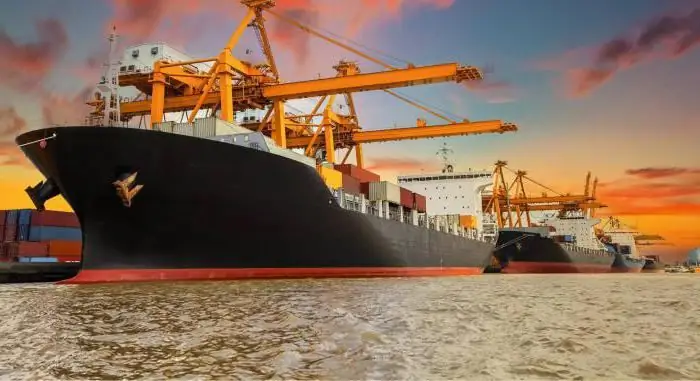2026 Author: Howard Calhoun | [email protected]. Last modified: 2025-01-24 13:10:37
Logistics from an economic point of view is the activity of organizing, managing and optimizing the movement of various kinds of flows from their source to the direct consumer. This science is divided into several types. One of them is transport logistics.

This is a kind of system that is responsible for organizing delivery. In other words, transport logistics is engaged in the movement of certain material flows from point A to point B. In this case, the optimal route is chosen. Active application of this field of knowledge occurs in the sixties of the XX century. It is during this period that the intensive development of production occurs. It became clear that knowledge of all points of the movement of raw materials makes it possible to identify losses. Thus, competent transport logistics reduces the cost of goods. A significant role in the development of science was played by the achievements of scientific and technical progress, thanks to which communication over vast distances became possible.
Functions and tasks
It is customary to distinguish between operational and coordination functions of logistics. The first are related to the management of the movement of values indirect production and distribution. The second is related to the coordination of the level of supply and demand. This includes the analysis and identification of the needs (mainly material) of the production process, planning and forecasting the development of markets, processing information about the needs of customers, and much more. In other words, based on the data received, logistics connects the needs of customers with the capabilities of the enterprise.
Now about the tasks. They can be divided into two large groups: public (global) and private. The first one should include the achievement of the maximum possible result at the minimum cost. The second group of tasks includes creating a minimum level of stocks, reducing the time period required for transportation, and many others.

If we talk about the functions characteristic of this type of science under consideration, such as transport logistics, then an important place is given to personnel, without which it is impossible to achieve the goal. This also includes the need to classify vehicles, as well as the organization of pricing policy.
Transport logistics: system and infrastructure
Next, we will talk about the transport and logistics system. This concept characterizes the entire set of customers and producers of goods, services, as well as the means of communication used for their interconnection, transport, buildings and structures, control systems and other resources. Transport logistics cannot exist without an appropriateinfrastructure.

After all, moving objects, storing them, warehousing and supporting all processes with financial and information flows is impossible if there are no technical means necessary for this. The infrastructure ensures uninterrupted and accurate performance of all functions. The final volume of costs largely depends on the quality of the transportation carried out. Therefore, transport logistics at the enterprise should also take into account the following aspects: the efficiency of each type of transport separately, the efficiency of organizing transportation from the producer to the consumer, as well as accounting for the storage and handling of goods, which is especially important for the client.
Conclusion
Transport logistics plays a huge role in the company's activities. This is a necessary link in the system, since this science is responsible for managing all flows, and material flow management is impossible without organizing its transportation. Thus, transport should not only be used efficiently, but also be flexible. This will make it possible to realize the main goal of the transport and logistics system even in the face of rapidly changing demand.
Recommended:
Logistics manager: job responsibilities, instructions, resume. Who is a logistics manager and what does he do?

With the development of the economy, the number of enterprises in its various sectors is also growing. Therefore, it is required to store and transport more and more different kinds of products. This activity should be organized by a certain specialist - a logistics manager, whose job responsibilities we will consider in this article
A logistics company is an enterprise that provides services for the transportation, processing and storage of goods. Rating of Russian logistics companies

Many foreign companies have been hiring third parties to provide services to perform non-core functions for them for a long period of time. This scheme is called "outsourcing". It means the involvement of a third party on a reimbursable basis in order to fulfill the tasks that the company faces. Outsourcing helps businesses to be more flexible, which allows them to make good profits
Transport taxes in Kazakhstan. How to check transport tax in Kazakhstan? Deadlines for paying transport tax in Kazakhstan

Tax liability is a huge problem for many citizens. And they are not always resolved quickly. What can be said about the transport tax in Kazakhstan? What it is? What is the procedure for paying it?
Work in logistics. The concept, tasks and functions of logistics

After Russia's transition to a market economy, the rapid development of business began in the country. However, there are still problems in the field of business cooperation regarding the movement and delivery of raw materials, finance, information and finished products. The issues of organizing all these processes relate to the work of the logistics departments of the enterprise and individual logistics companies
Functional areas of logistics. What does the logistics department do?

The article will talk about what are the functional areas of logistics, as well as what logistics managers do

